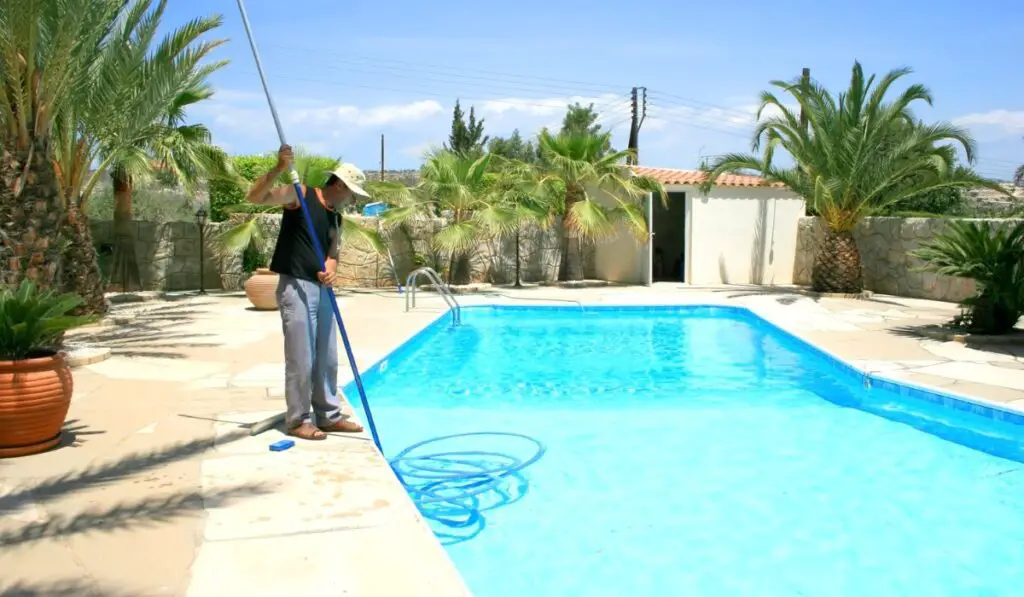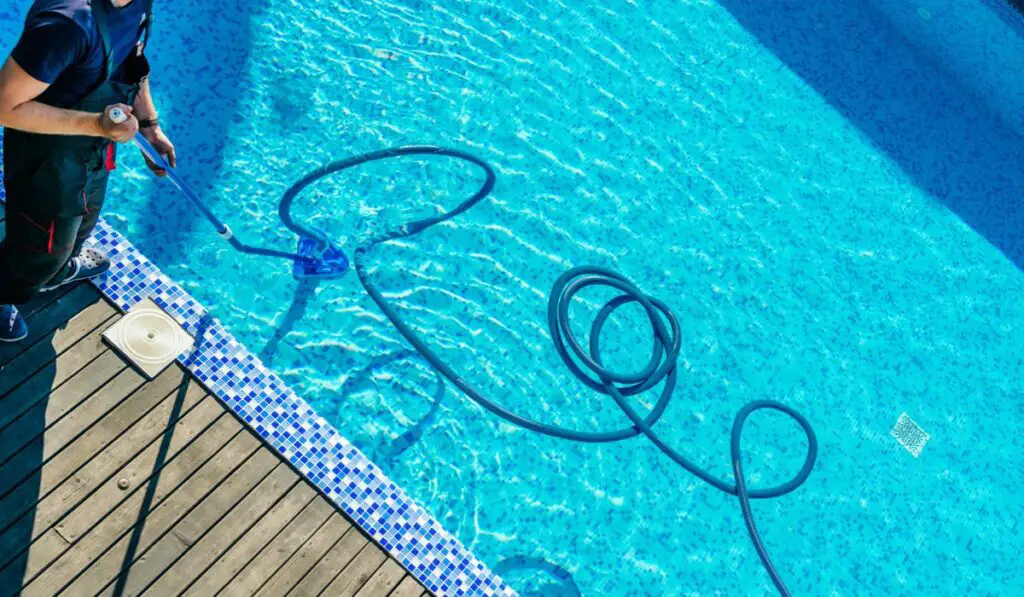Are you concerned about how to properly maintain your pool so that’s it’s always ready for a relaxing swim? Cleaning any pool is essential, but it’s especially important with gunite pools, which are made of a porous material that attracts algae. So, how can you keep your gunite pool in tip-top shape?
In order to properly maintain your gunite pool, you should clean dirt and debris from the water, test the chemical balance, add algaecide, and clean the pump basket and skimmer at least once a week. It’s also best to winterize the pool and check for leaks at least once a year.
Proper gunite pool maintenance will not only ensure that your pool has a good, long life but it will also allow you to make the most of your summer holidays every year. Let’s look at how frequently you should clean your pool, whether you should hire a professional for maintenance, the total costs of maintenance, and when you should resurface your pool.
How Often Does a Gunite Pool Require Maintenance?

The answer to this question depends on how well you care for your pool. Some tasks, like brushing, need to be performed once a week, while others, like winterizing, need to be performed once or twice a year.
Here’s a more detailed breakdown of how frequently you should clean your gunite pool:
Clean Dirt and Debris (Weekly)
It’s a good idea to remove the debris, leaves, and other contaminants floating in your pool at least once a week. Some debris will float on the surface, while some will sink to the bottom of the pool, so make sure you perform a thorough cleaning and take it all out.
It’s best to scrub the floor and walls of the pool with a good scrub brush (on Amazon) as well.
Test Chemicals (Weekly)
If the chemicals in your swimming pool aren’t properly balanced, you won’t be able to enjoy clean, clear water.
We recommend performing weekly tests of pH balance, alkalinity, and chlorine levels, as this will help prevent algae, bacteria, and other contaminants from taking root. An easy-to-use pool test kit (on Amazon) is essential for this process.
Add Algaecide (Weekly)
If algae growth in your pool remains unchecked, you’ll have an infestation on your hands very quickly. It’s advisable to add algaecide (on Amazon) to your gunite pool at least once a week to keep things under control.
Clean Pump Basket and Skimmer (Weekly)
Along with cleaning the pump filter regularly, you should also clean out your pump baskets and skimmer weekly to achieve optimal pool water cleanliness. You can use a garden hose to remove any debris that’s stuck or difficult to get out.
It’s also good practice to cover the pool with a durable pool cover (on Amazon) if it’s not in use — and to trim away any hedges, trees, or bushes near it to minimize the amount of debris that falls into your pool.
Winterize (Annually)
If you don’t plan on draining your pool every winter, then you should winterize it to prevent issues from springing back up when you open it up again in the summers.
Failing to winterize your gunite pool every year could lead to cracks in the cement or the plaster of the floor and walls.
For this reason, it’s important to maintain the right chemical balance throughout the cold months, thoroughly clean the filter and pump, add algaecide and pool shock, drain pool hoses, drain pool water to an acceptable level, and cover the swimming pool.
Check for Leaks (Annually/As-Needed)
It’s always a good idea to check the pool pump and filter for cracks or leaks before using them in your pool. Doing so each year will help minimize the chances of a leak midway through the summer, allowing you to have fun, uninterrupted pool parties.
Should I Hire a Professional for My Pool Maintenance?

Although pool maintenance sounds like a lot of work, it’s mostly work that you can easily do yourself. However, if you’re a busy person who doesn’t have a lot of time for pool cleaning and maintenance, then hiring a professional is the way to go.
How Much Do Pool Chemicals Cost?
Since gunite pools are more susceptible to algae infestations, you’ll inevitably need more chemicals to maintain them.
The cost of chemicals varies with each pool and depends on the amount of chlorine or other pool chemicals you add to the water. The final cost will also depend on the brand that you purchase.
However, according to a rough estimate, you’ll have to spend at least $20 whenever you purchase chlorine tablets, liquid, or powder. Keep in mind that you’ll need other chemicals as well, such as pool conditioner and pool shock.
As a whole, you may need to spend approximately $750 every year on chemicals and other maintenance-related supplies.
Maintenance Costs of Saltwater Pools
If you own a saltwater pool, you’ll need to add salt instead of chlorine to the water. This will affect your maintenance costs.
On average, you’ll have to spend at least $15 per salt bag. However, it’s important to note that you may need anywhere from half a salt bag to more than 15 bags to ensure proper pool chemistry.
When Should My Gunite Pool Be Resurfaced?
While gunite pools are certainly one of the best options in terms of aesthetics, they do need additional care and maintenance to keep their pristine condition. Generally, gunite pools need to be resurfaced after every seven to ten years.
There are a few signs that can help you determine when it’s time to resurface your pool:
Stains
Stains in your pool are inevitable. While they’re not a serious problem most of the time, they can build up over the years and diminish the beauty of your gunite pool.
Stains are usually caused by algae, debris, leaves, and other mineral and chemical output. If you can’t remove the stains, then it may be time to resurface your pool.
Rough Texture
A pool surface that’s rougher than usual is a sign of deterioration. If you don’t resurface your gunite pool, the texture will only get worse.
If you already have a rough pool surface, you can add a different finish, like tile or any other smooth aggregate.
Leaks
If your gunite pool isn’t properly holding water, then resurfacing it might fix the issue. If you don’t resurface your pool, it will continue to lose water. You’ll then have to refill the pool time and again, ultimately leading to an increase in your water bill.
In the long run, it’s just better and more cost-effective to resurface your pool.
